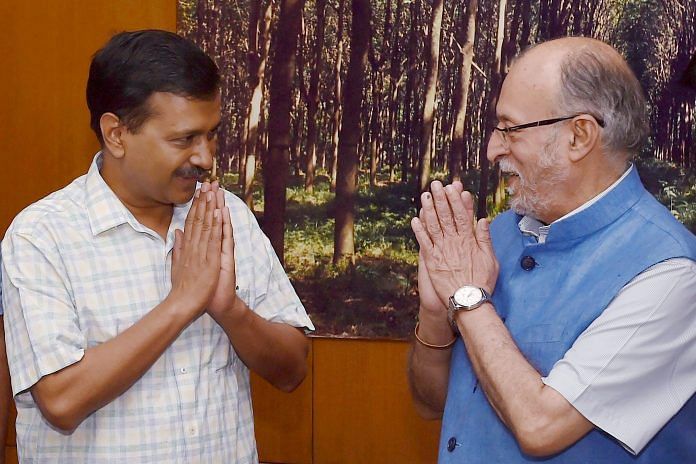The wrangling between AAP and Centre over L-G’s role in governing Delhi ends, with a victory for Arvind Kejriwal.
New Delhi: Lieutenant-Governor (L-G) of Delhi is bound to hear the aid and advice of the Council of Ministers, and cannot act like an “obstructionist,” the Supreme Court ruled Wednesday, ending a three-year-long turf war.
The five-judge bench of the apex court led by Chief Justice of India Dipak Misra gave its verdict in a plea filed by the Aam Aadmi Party (AAP) that challenged an August 2016 Delhi High Court order which ruled that L-G was the boss of Delhi. The HC ordered that all decisions taken by the state needed the mandatory approval of the L-G.
Today’s judgment is important because nine appeals challenging the validity of the notifications issued by the state government will now be adjudicated in lieu of the role the L-G will now play in the administration of Delhi.
Here are key extracts from the judgment.
L-G’s power vis-à-vis Delhi’s elected government
“The Lieutenant-Governor has not been entrusted with any independent decision-making power,” but rather is bound by the “aid and advice” of the council of ministers,” the court ruled. “He has to either act on the ‘aid and advice’ of Council of Ministers or he is bound to implement the decision taken by the President on a reference being made by him,” the court noted.
“The LG should not act in a mechanical manner without due application of mind so as to refer every decision of the Council of Ministers to the President,” the court said. “Any matter” as referred to in the proviso 239AA, does not automatically mean “every matter,” the court added.
“There is no room for absolutism and there is no room for anarchism also,” said the court while pronouncing the verdict.
“The power given to the Lieutenant Governor under the proviso to Article 239AA(4) contains the rule of exception and should not be treated as a general norm.”
“The Lieutenant Governor need not, in a mechanical manner, refer every decision of his minister to the President. He has to be guided by the concept of constitutional morality.”
The apex court clarified that even though the council of ministers were bound to forward all communication to the L-G’s office, this did not mean that the concurrence of the L-G was required.
On special status of Delhi
“Thus, it can be very well said that the executive power of the Union in respect of NCT of Delhi is confined to the three matters in the State List for which the legislative power of the Delhi Legislative assembly has been excluded under Article 239AA(3)(a). Such an interpretation would thwart any attempt on the part of the Union Government to seize all control and allow the concepts of pragmatic federalism and federal balance to prevail by giving the NCT of Delhi some degree of required independence in its functioning subject to the limitations imposed by the Constitution.”
On interpretation of Constitution
“If a well deliberated legitimate decision of the Council of Ministers is not given effect to due to an attitude to differ on the part of the Lieutenant Governor, then the concept of collective responsibility would stand negated.”
The Centre and the state “must embrace a collaborative federal architecture by displaying harmonious coexistence and interdependence so as to avoid any possible constitutional discord,” he said.
The top court judge clarified that the Constitution has mandated a federal balance that accords a certain degree of freedom to the States. This balance, he said, ensures that “the Union does not usurp all powers and the States enjoy freedom without any unsolicited interference from the Central Government with respect to matters which exclusively fall within their domain.”
Furthermore, the top court relied on the nine-judge bench in the New Delhi Municipal Corporation case to rule out the possibility of granting statehood to Delhi. “…It is clear as noon day that by no stretch of imagination, NCT of Delhi can be accorded the status of a State under our present constitutional scheme,” CJI Misra recorded in his conclusion.
On need for balance and compatibility for participatory democracy
In his judgment Justice Ashok Bhushan observed, “It is the requisite constitutional stimulus to sustain the fundamental conception of the participative democracy so that the real pulse is felt and further the constitutional promise to the citizens is fulfilled. It gets rid of the unpleasant twitches and convulsions.”
“The proviso to Article 239AA is in the nature of a protector to safeguard the interests of the Union on matters of national interest in relation to the affairs of the National Capital Territory. Every trivial difference does not fall under the proviso. The proviso will, among other things, encompass substantial issues of finance and policy which impact upon the status of the national capital or implicate vital interests of the Union,” Justice Chandrachud observed.
The court said, “The interest of the States inherent in a federal form of government gains more importance in a democratic form of government as it is absolutely necessary in a democracy that the will of the people is given effect to.”
“To subject the people of a particular State/region to the governance of the Union, that too, with respect to matters which can be best legislated at the State level goes against the very basic tenet of a democracy,” the court concluded.




Pl. give your express comments on babus, who refuse to accept services is not a reserve subject after the verdict. Is it that Govt. has to approach Apex court for specifics?